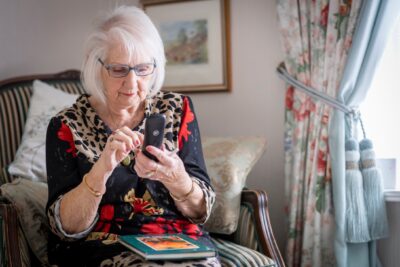 On the occasion of the World Elder Abuse Awareness Day, AGE co-organised a high-level seminar addressing the issue of older people’s human rights in the area of long-term care. The event presented two new relevant EU initiatives and discussed how to strengthen legal protection of older people in need of care and assistance and safeguard dignity in old age.
On the occasion of the World Elder Abuse Awareness Day, AGE co-organised a high-level seminar addressing the issue of older people’s human rights in the area of long-term care. The event presented two new relevant EU initiatives and discussed how to strengthen legal protection of older people in need of care and assistance and safeguard dignity in old age.
————-
By Nena Georgantzi and Maude Luherne
While human rights apply to everyone without age limits, the realisation of older persons’ human rights is in practice impeded by negative attitudes and discrimination towards older persons. Older persons in need of care and assistance are particularly vulnerable to human rights breaches. They are more exposed to the risk of elder abuse because of their specific situation of social isolation, health problems, frailty, or financial limitations.
Elder abuse occurs in all European countries and takes different forms, including psychological intimidation or threats, neglect, financial or material exploitation and other less visible aspects of maltreatment. Most often it takes place in the home where the older person lives, but elder abuse also happens in residential facilities and all other types of care settings. Although information on its prevalence across Europe is incomplete, several surveys have increased our knowledge of the scale and nature of the problem. Nevertheless, the real extent of elder abuse remains unknown due to poor statistics, underreporting and difficulties by societies to recognise the true scale of abuse and neglect. Elder abuse does not only consist of deliberate attempts to harm older persons. In fact, many times habits, routines and poor quality of services may lead to inadequate or inappropriate care or even amount to human rights breaches.
However, the way existing human rights instruments are applied to older persons depends upon self-regulation by individual decision-makers at the different levels of government, which also means huge discrepancies within and among countries. Therefore the link between human rights instruments and their actual implementation in the wide range of existing care services (institutions, home care services and other types of care services) across Europe is still far from being obvious. The economic crisis in Europe creates additional pressure on social and health systems, which often fail to deliver appropriate care, and it also prevents older persons claiming and enjoying their rights. Their dignity and, in some cases, their lives are at stake.
Two new initiatives addressed both sides of the challenge. Firstly, the Council of Europe recommendation on the promotion of human rights of older persons CM(2014)2, which is the first European instrument dedicated to the rights of older persons. Secondly, the Social Protection Committee report ‘Adequate social protection for long-term care needs in an ageing society’ which offers an analysis of the context, the challenges and proposals for solutions to ‘close the gap’ in Europe. It is complemented by Key messages adopted by the EPSCO Council on Friday 19 June 2014.
To discuss these instruments and mark the World Elder Abuse Awareness Day, AGE Platform Europe together with the Council of Europe and the European Commission Directorate-General on Employment and Social Affairs co-organised a high-level seminar on ‘Human Rights of Older persons: Who cares?’ focusing on the rights of older persons in need of care and assistance. The event built on the outcomes of the 2013 regional symposium on preventing abuse and neglect of older persons in Europe, which was jointly organised by the United Nations Office of the High Commissioner for Human Rights (OHCHR) Regional Office for Europe and the European Commission (Directorate-General for Employment, Social Affairs and Inclusion), stressing that insufficient investment in prevention, independent living and high quality care could be seen as undermining older persons’ human rights.
 The event started with an introduction from Ambassador Torbjørn Frøysnes, Head of the Brussels Office of the Council of Europe to the EU, followed by an introduction of the two new instruments of the Council of Europe (Mathias Kloth) and of the Social Protection Committee Working Group on Ageing (Niclas Jacobson). During the panel discussion Jan Jarab Regional representative for Europe of the OHCHCR addressed the protection gaps in the existing legal and policy framework that the CoE recommendation and the EU report are aiming to fill and what action at national, local, regional and international level could be foreseen to better tackle them. Liz Mestheneos from 50+ Hellas, stressed the challenges older people face in accessing care in the context of diminishing public services and reduced quality. Sarah Mahon from the Health Service Executive in Ireland and Geert Roggeman from the European Social Network, insisted on the role national healthcare systems and service providers have in applying human rights principles in care provision.
The event started with an introduction from Ambassador Torbjørn Frøysnes, Head of the Brussels Office of the Council of Europe to the EU, followed by an introduction of the two new instruments of the Council of Europe (Mathias Kloth) and of the Social Protection Committee Working Group on Ageing (Niclas Jacobson). During the panel discussion Jan Jarab Regional representative for Europe of the OHCHCR addressed the protection gaps in the existing legal and policy framework that the CoE recommendation and the EU report are aiming to fill and what action at national, local, regional and international level could be foreseen to better tackle them. Liz Mestheneos from 50+ Hellas, stressed the challenges older people face in accessing care in the context of diminishing public services and reduced quality. Sarah Mahon from the Health Service Executive in Ireland and Geert Roggeman from the European Social Network, insisted on the role national healthcare systems and service providers have in applying human rights principles in care provision.
The event was highly relevant to increase awareness of the rights of older persons and discuss how the implementation of these rights can be taken into account into the European Commission’s work on long-term care and the fight against elder abuse. Testimonies from the panelists and from the floor emphasized the challenges and opportunities of applying a rights-based approach in the care field, especially in a period of economic and social crisis. The discussions also focused on how to balance cost-efficient policies with the need to ensure high-quality care services in Europe and respect for older persons’ dignity. The participants highlighted the importance to take into account the needs of professional carers and migrant workers. The event showcasesed that empowering older persons and their families through European and national policies is a catalyst to enforcing their human rights whilst achieving more sustainable care systems. The European Charter for the rights and responsibilities for older people in need of care and assistance, its accompanying guide and the European Quality framework for long-term care services are examples of European initiatives helping to build some steps to that direction.
A more detailed report on the event and on the closed experts workshop organized by AGE in the afternoon will be soon available on AGE’s website: www.age-platform.eu/age-work/age-policy-work/dignified-ageing/age-work/2143-save-the-date-human-rights-for-older-persons-in-europe-who-cares
For more information on AGE’s work…
- On the human rights of older persons:
Contact person: Nena Georgantzi This email address is being protected from spambots. You need JavaScript enabled to view it.
">nena.georgantzi@age-platform.eu
This email address is being protected from spambots. You need JavaScript enabled to view it.
">Special briefing on the human rights of older persons
AGE work on human rights
- On long-term care and the fight against elder abuse:
Contact person: Maude Luherne maude.luherne@age-platform.eu
European Charter of the rights and responsibilities of older people in need of long-term care and assistance
European Quality framework for long-term care services
AGE work on Dignified Ageing
------------------------

INTERVIEW: Matthias KLOTH
Human Rights Law and Policy Division Council of Europe
1. What is the main expected outcome of the Council of Europe’s Recommendation on the Promotion of Human Rights of Older Persons with regard to the fight against elder abuse?
“The abuse of older persons is an extremely serious phenomenon both in Europe and worldwide. If we take the statistics issued by the Regional Office for Europe of the World Health Organisation in a report in 2011 on the abuse of older persons in Europe, it concerns 4 million older persons in that region in any given year. This number is vast and alarming. The Council of Europe’s Recommendation on the Promotion of Human Rights of Older Persons of February 2014 seeks to promote, protect and ensure the full and equal enjoyment of all human rigths and fundamental freedoms by all older persons, and to promote respect for their inherent dignity. It has a full chapter on the protection of older persons from violence and abuse, both at home and in institutional care, also including financial abuse. The Recommendation is a common position by all 47 member states of the Council of Europe, and reflects already existing standards by that organisation’s monitoring bodies, notably the European Court of Human Rights and the European Committee of Social Rights. It attempts to tailor those standards specifically to the situation and needs of older persons, and to close gaps in their implementation. Moreover, the Recommendation proposes to all states a guide of good practices collected from already existing measures adopted in particular countries in Europe. This includes many useful examples given in order to prevent and combat the abuse of older persons."
2. Is an assessment of this outcome foreseen?
“The Recommendation provides that its implementation will be assessed after five years, that is in 2019. Member states and other relevant stakeholders will be asked, presumably in the form of a questionnaire, to report what progress has been made in implementing the principles contained in the instrument. There is a lot that non-governmental organisations can do to improve this assessment, not least a timely reminder that states are asked to ensure that the principles set out in the recommendation should be complied with in national legislation and practice relating to older persons.”
Click here to download this article in pdf format






